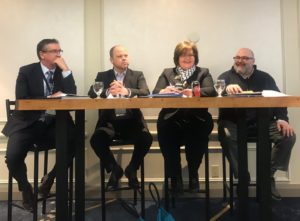By Jon Kiely, Tourism HR Canada Vice-President, Product Innovation and Communications

I’ve personally attended the annual Hotel Association of Canada (HAC) Conference numerous times in my 20 years with Tourism HR Canada; this year was truly reinvigorating. The vibe was upbeat and positive, with a very noticeable increase in female participation in all facets of the event. Hats off to the HAC team and their meeting planners, Big Picture Conferences, for the amazing event.
I was also thrilled to hear the genuine interest and excitement about the new Destination Employment program coordinated by Tourism HR Canada, the Hotel Association of Canada, and strategic regional partners across the country. The opening and closing keynotes highlighted the innovative program and it was a big topic of conversation during breaks and lunch.
Thursday afternoon, I was fortunate to be part of a panel discussing Destination Employment. Moderated by the always eloquent Alana Baker (HAC), I was joined by Adam Morrison from Ontario regional partner OTEC, David Clark from the Atlantica Hotel Halifax, and Corinne Prince from Immigration, Refugees and Citizenship Canada, without whom this project would not be garnering the interest and excitement it has.
The panel discussed the Destination Employment model from the participant perspective, the hotels actively participating, and the role the program plays in the federal government’s work to improve worker shortages while providing opportunity and much-needed support for new Canadians. I highlighted the various innovative training initiatives we’ll be piloting to assist with onboarding these new employees, while also improving their language proficiency through authentic workplace resources and emerging training technologies.

A key attribute of Destination Employment is its flexibility. It is being deployed in tandem with existing provincial and municipal programs that serve similar client needs. Rather than functioning as competition to other programming, Destination Employment has been designed to be adaptable and used not only as its own fully-fledged program, but also as a resource to augment existing programs that are unable to address specific employer or participant requests. It improves the offering and performance of numerous programs (many funded with taxpayer dollars), providing assistance to the sector’s labour needs, opportunities for newcomers, and a workable model for government. Destination Employment is truly win-win-win.
Following the panel, a line-up of audience members sought to learn more about the program. There was significant interest in the prospect of expanding the program to different regions in Canada and even to different industries within tourism. We’ll follow up with these individuals as we seek additional funding to bring this amazing opportunity to as many businesses, newcomers, and regions as we can.
I’m already eager for next year’s HAC Conference. We’ll showcase a full year of Destination Employment positively impacting the lives of new Canadians and improving the growth potential of tourism businesses seeking ways to combat labour shortages.

